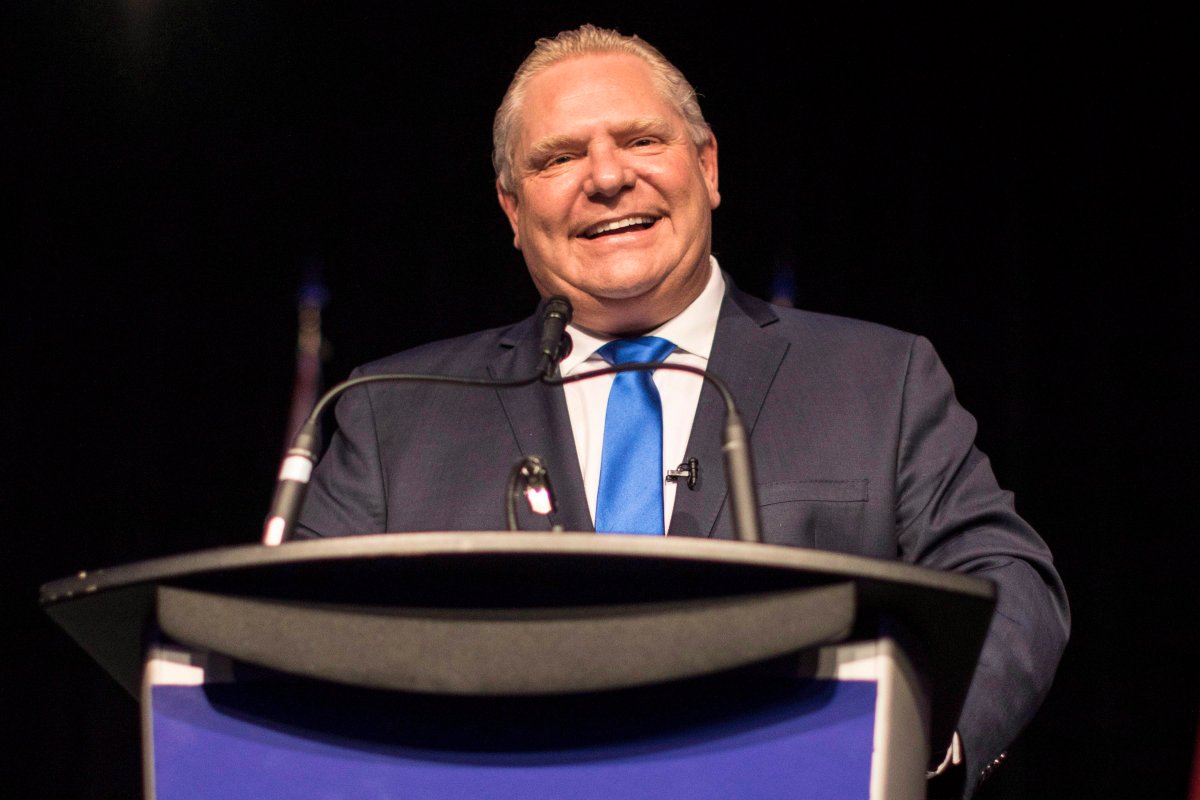If elected, Progressive Conservative leader Doug Ford is promising to put an end to provincial income taxes for minimum wage earners in Ontario.

But are minimum wage earners actually paying taxes to begin with? And, when it comes to relief for those on low incomes, how does the PC plan stack up against the Liberals’ intentions to boost minimum wage to $15?
The background
The Ontario Liberals boosted the province’s minimum wage to $14 as of Jan. 1, with plans to bump it up by another dollar the following year.
Echoing concerns expressed by businesses, several reports found the move could have a negative impact on employment. The Financial Accountability Office of Ontario said the minimum wage increases could lead to 50,000 job losses.
Ford has said that he would halt the plan, freezing minimum wage at $14, out of concern for businesses’ bottom lines and the possibility of job cuts.
On Monday, the Ontario PCs unveiled a proposal to eliminate taxes for full and part-time workers making minimum wage through a tax credit. The plan would cost an estimated $500 million annually and would be implemented by Jan. 1.
- Posters promoting ‘Steal From Loblaws Day’ are circulating. How did we get here?
- Canadian food banks are on the brink: ‘This is not a sustainable situation’
- Is home ownership only for the rich now? 80% say yes in new poll
- Investing tax refunds is low priority for Canadians amid high cost of living: poll
“Under a PC government, if you are making minimum wage, you are going to pay no income tax at all,” Ford said in a media release.
To be clear, Ford’s proposed tax credit would only apply to provincial taxes. (Three quarters of the tax rate for minimum wage workers is federal).
A look at the numbers
Ontario residents pay a provincial tax rate of 5.05 per cent on their first $42,201 earned annually. For context, Ontario has among the lowest tax rates in Canada for low-income earners when you compare the smallest income brackets in each province.
Assuming a 40 hour work week for 50 weeks per year, a minimum wage earner makes a gross income of $28,000.
According to a background document on the policy from the PC party, at that income level you’d owe about $817 in provincial tax after the basic personal amount deduction — all of which the party promises would be credited at tax time.
The amount of the tax credit is based on income earned, the party says, but will only apply to minimum wage earners. So, a part-timer who makes $20,000 per year but gets paid $20 an hour won’t be eligible, for example.
Then, there’s the complicated question of whether those making under $28,000 actually end up owing taxes.
In their example, the PCs claimed the plan could save full-time minimum wage earners over $800 per year. However, that number does not take any provincial tax credits into consideration, as one economist pointed out.
Minimum wage earners can already receive hundreds, if not more, in provincial benefits and tax credits.
The provincial government’s online tax benefits calculator, a tool intended to provide rough estimates for unofficial purposes, shows a single minimum wage earner with no children who paid $12,000 in rent in 2017 could receive an estimated $540 through the Ontario Sales Tax Credit and Ontario Energy and Property Tax Credit.
There are also additional credits for seniors, parents, and an energy rebate for residents of Northern Ontario. (Not to mention federal tax credits).
Reaction and analysis
While that scenario is hypothetical, economist Sheila Block’s analysis of actual tax data suggests things play out similarly in the real world.
Last month when Ford initially hinted at this plan, Block, a senior economist with the Canadian Centre for Policy Alternatives, crunched the numbers in a blog post, using the most recent data from the Canada Revenue Agency.
She found that two thirds of those who earn less than $30,000 already don’t pay income tax due to existing deductions and credits. Those who do pay taxes paid an average of $485 for that year, Block said.
LISTEN: Economist Sheila Block joins Mike Stubbs on 980 CFPL
She said on Tuesday that a $15 minimum wage would put earners ahead by about $1,100 in comparison to Ford’s tax credit plan.
“The trade-off for minimum wage workers is between taking home at least $1,899 (post tax) more in wages (at $15/hour), or staying at $14/hour and getting a refund of $817,” Block wrote.
However, she said it’s likely the refund would be less than that, because existing tax credits and deductions would have already reduced the amount of tax payable.
“You gotta do the math in this pre-election period,” she told host Mike Stubbs on 980 CFPL on Tuesday.
“And something that sounds good at the front of it … I think you really want to check it out, ” she said of the PC plan.
LISTEN: Christine Van Geyn joins The John Oakley Show
Christine Van Geyn, Ontario director for the Canadian Taxpayers’ Federation, said on Monday she supports the PCs plan as a first step to reduce taxes and the best way to provide relief for minimum wage earners.
However, she said she has questions about the details and the cost.
“I’d like to have Mr. Ford explain, first of all, how he’ll pay for it,” she told The John Oakley Show on 640 Toronto on Monday.
“But second of all, how do you prevent someone from just earning, you know, just above minimum wage from saying ‘hey, maybe give me a salary decrease so that I’m eligible for the tax credit’?”
The Ontario election is expected to be held on June 7.
-With files from The Canadian Press








Comments